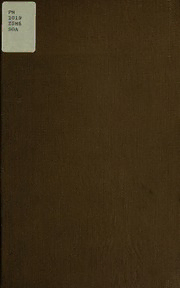
A dictionary of the Numípu or Nez Perce language PDF
Preview A dictionary of the Numípu or Nez Perce language
&mM wMf^, C/Y' ^(Aax-AlaJ j*.; /'•'i ^ • DICTIONARY OF THE Numipu or Nez Perce Language, BY A Missionary of the Society of Jesus, IN THE ROCKY ])I{>‘CJNTA;INS. i f \ PART T'vvjM fv? — ENGLISH NEZ PERCE. 30801 ST. IGNATIUS’ MISSION PRINT, MONTANA. 1896. Entered, according to Act of Congress, in the year 1895, by Bev. j.eo?oli> yak gobp, s. j, In the office (|f the Lib«*arian of Congress, at Washington. f ^ 01^ . . PBELIMINABY RIMAEKS. ^ ^ ,,, , PronKncfatioti of the orthography adopted ' . ' • 4 ' ' in writing the Indian language. Pronounce all the vowels as in the Patin or German language. ¥, as in the English word yetloio. Hj with a very slight aspiration. X G> as Ch in the German language or as in the Greek. , S, as in the English word she. W U, follow^ed by A, E, J, as in the English language ; but, if it is accented or preceded by a consonant, it retains its proper sound, as said in the pronunciation of vowels. Z, as in the German language or as jin the English word chintz. The connection of Ck, which occurs a few times, is pro- nounced as double K. Many slight alterations in pronouncing the Indian vowels can only be learned by hearing. EEMAEKS •EEGAEDING THE VEEBS. Of verbs ini» this Dictionary is given the first person of the present tense in the Indicative mood. The verbs, whose termination in the present tense of the Indicative mood is sa or se, form the indefinite past by dropping s. Those verbs, whose termination sa or se is preceded by one of the vowels a, e. o, ii, form their past indefinite by changing s into The, verbs, which in the present tense of the Indicative mood terminate in za or ze, form the indefinite past by changing z into ii. The future tense of all the verbs is formed from the past indefinite by changing the termination or e into ii. Those verbs, whose future tense is wanting in the follow- ing catalogue, have no proper form for their indefinite past, and the one given has the meaning of an imperfect tense. Any verb, which in the formation of its past indefinite deviate from the foregoing rules, is given in the following catalogue.
